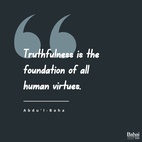The views expressed in our content reflect individual perspectives and do not represent the official views of the Baha'i Faith.
Baha’is around the world strive to create unity everywhere they go, as it is the main principle of the Faith:
… it is our duty to put forth our greatest efforts and summon all our energies in order that the bonds of unity and accord may be established among mankind. For thousands of years we have had bloodshed and strife. It is enough; it is sufficient. Now is the time to associate together in love and harmony. – Abdu’l-Baha, The Promulgation of Universal Peace, p. 30.
To achieve unity throughout the world, Baha’is are trying to learn how we can help create unity through localized free educational programs that address the spiritual nature in all of us. Baha’is do this by hosting children’s classes, where children from all religious backgrounds learn about spiritual virtues; junior youth programs in which youth from the ages of 12 to 15 are aided to use their growing energies, talents and abilities to serve others; and a series of institute courses that increase the capacity of adults and youth to offer more and more complex acts of service to their communities.
These kinds of educational activities, the Baha’i writings say, can assist in releasing humankind’s vast inner potential:
The Great Being saith: Regard man as a mine rich in gems of inestimable value. Education can, alone, cause it to reveal its treasures, and enable mankind to benefit therefrom. – Baha’u’llah, Gleanings from the Writings of Baha’u’llah, p. 260.
When I was five years old my family moved to the beautiful islands of Fiji to help support the growth of the Baha’i community there. Growing up, I had the bounty of being part of a weekly Baha’i children’s class, and later one of the first junior youth groups in the country. The people who help the junior youth meet, plan and study together are called “junior youth animators,” and it was through conversations with my animators that I really began to appreciate all the program did for me and my friends. I decided that in the future I would become an animator myself.
At 16 my family supported my efforts to begin animating my own junior youth group close to my home. Every week my brothers, mother and I would walk through a tapioca plant-lined pathway to the humble homes of the junior youth who took part in my classes. The culture of the Fijian people is something I marvel at. They were so open, welcoming and trusting, allowing a complete stranger into their lives and trusting their children with him.
As I gained experience as an animator, the junior youth coordinator for my area began to organize an expansion in another neighborhood to try and start new groups. We could all perceive change in the junior youth we were working with through the concepts they studied, the acts of service they carried out and the relationships we were building with their families—so we wanted to see how this kind of education, focused on the spiritual aspects of young people, could affect a community if every junior youth living there got involved.
The area we identified was a neighborhood called Wailea (pronounced why-lay-ah), and although I had never been there before, I agreed to go and help start new groups. The youth who were going decided to meet at a bakery I passed every day on my way to school, across the road from a gas station and an empty field where people would play touch rugby every afternoon.
On the afternoon of the expansion, I walked to the bakery and met with my friends. We began to walk along the dirt road between the gas station and the field. I had thought that this was just a road people would park their cars on as they played on the field, but it was actually a portal to another world. The dirt road opened up to hundreds of homes, built from wooden frames and corrugated iron walls and roofs. This was what we called a settlement, where people quickly constructed ramshackle housing on property they didn’t own, complete with its own set of small vendors out of the back of certain homes, a bridge over a small river and two or three churches. It really was like a village hidden away in a small corner of the city. Many of the homes lacked running water or electricity. I don’t like to call it a slum, but that is certainly how some may have described it.
I was amazed. This was something I had gone past every morning and yet had no idea even existed. How many more were like me, living a sheltered life and unaware of the poverty thousands faced in their own city?
As I began to share with the people there about the junior youth program, I understood more about why we had chosen this place to start new groups. These people were not only highly receptive to the program, but they needed it. How do you break cycles of poverty? Experience has shown that it can be done through education, capacity-building and service at the grassroots. Through service to others, a whole community can progress both materially and spiritually, and things that once seemed impossible become attainable.
I want to note here that although the people we met may have been materially impoverished, they also have a heightened sense of community and spirituality. Everywhere you looked you would be acknowledged and greeted with a smile. People with nothing would take you into their homes and offer you tea and refreshments. They had few material possessions, but they had amassed a sizeable portion of spiritual wealth, and through capacity-building they would be able to channel this into reciprocal acts of service which could benefit them materially as well.
In many other places in society we face another kind of poverty, a spiritual one. Deprived of a sense of community and spirituality, many materially prosperous areas experience a sort of spiritual bankruptcy, where individuals keep to themselves and only act in ways that benefit them. An attitude in which everything is considered acceptable, and the phrase “to each their own” characterizes peoples thoughts and actions, allows a paralysis to take hold and standards of morality to gradually dissolve. In many cases, these areas have as much need if not more for spiritual education.
Nearly five years have passed since those initial expansions in Wailea took place, and now those who have graduated from the junior youth program have become animators and children’s class teachers themselves.
This experience made me realize how privileged so many of us are. Having a strong spiritual foundation as well as a relatively prosperous life materially creates a sense of responsibility. If I have been given this gift of spiritual education, I must share it. Who am I to deprive others of this gift?

















Comments
Sign in or create an account
Continue with Facebookor